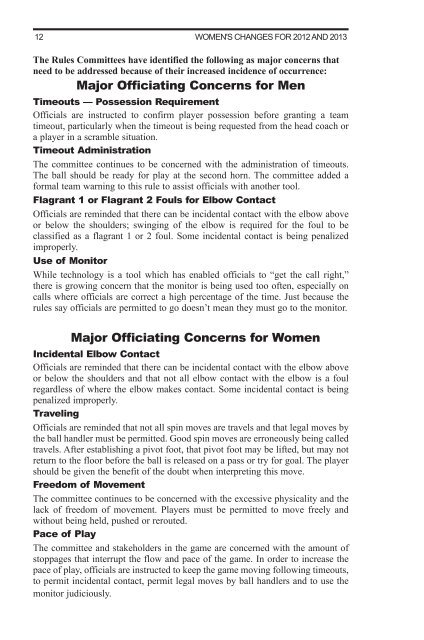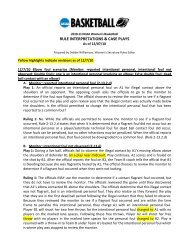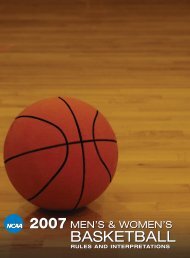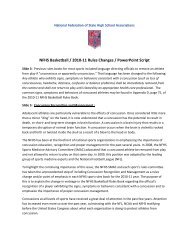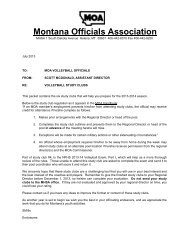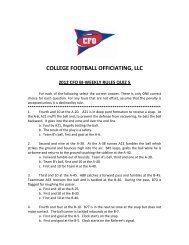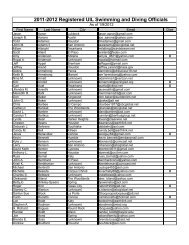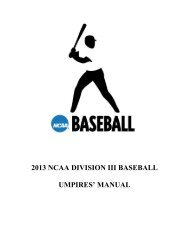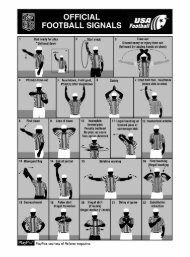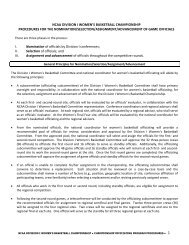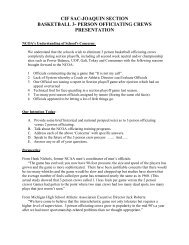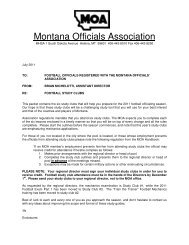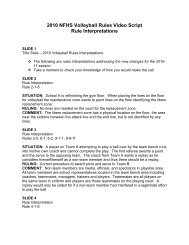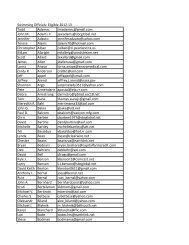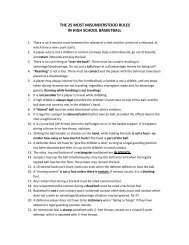2011-12 AND 2012-13 MEN'S AND WOMEN'S RULES - NAIA
2011-12 AND 2012-13 MEN'S AND WOMEN'S RULES - NAIA
2011-12 AND 2012-13 MEN'S AND WOMEN'S RULES - NAIA
Create successful ePaper yourself
Turn your PDF publications into a flip-book with our unique Google optimized e-Paper software.
<strong>12</strong> wOMEN's Changes for 20<strong>12</strong> and 20<strong>13</strong><br />
The Rules Committees have identified the following as major concerns that<br />
need to be addressed because of their increased incidence of occurrence:<br />
Major Officiating Concerns for Men<br />
Timeouts — Possession Requirement<br />
Officials are instructed to confirm player possession before granting a team<br />
timeout, particularly when the timeout is being requested from the head coach or<br />
a player in a scramble situation.<br />
Timeout Administration<br />
The committee continues to be concerned with the administration of timeouts.<br />
The ball should be ready for play at the second horn. The committee added a<br />
formal team warning to this rule to assist officials with another tool.<br />
Flagrant 1 or Flagrant 2 Fouls for Elbow Contact<br />
Officials are reminded that there can be incidental contact with the elbow above<br />
or below the shoulders; swinging of the elbow is required for the foul to be<br />
classified as a flagrant 1 or 2 foul. Some incidental contact is being penalized<br />
improperly.<br />
Use of Monitor<br />
While technology is a tool which has enabled officials to “get the call right,”<br />
there is growing concern that the monitor is being used too often, especially on<br />
calls where officials are correct a high percentage of the time. Just because the<br />
rules say officials are permitted to go doesn’t mean they must go to the monitor.<br />
Major Officiating Concerns for Women<br />
Incidental Elbow Contact<br />
Officials are reminded that there can be incidental contact with the elbow above<br />
or below the shoulders and that not all elbow contact with the elbow is a foul<br />
regardless of where the elbow makes contact. Some incidental contact is being<br />
penalized improperly.<br />
Traveling<br />
Officials are reminded that not all spin moves are travels and that legal moves by<br />
the ball handler must be permitted. Good spin moves are erroneously being called<br />
travels. After establishing a pivot foot, that pivot foot may be lifted, but may not<br />
return to the floor before the ball is released on a pass or try for goal. The player<br />
should be given the benefit of the doubt when interpreting this move.<br />
Freedom of Movement<br />
The committee continues to be concerned with the excessive physicality and the<br />
lack of freedom of movement. Players must be permitted to move freely and<br />
without being held, pushed or rerouted.<br />
Pace of Play<br />
The committee and stakeholders in the game are concerned with the amount of<br />
stoppages that interrupt the flow and pace of the game. In order to increase the<br />
pace of play, officials are instructed to keep the game moving following timeouts,<br />
to permit incidental contact, permit legal moves by ball handlers and to use the<br />
monitor judiciously.


